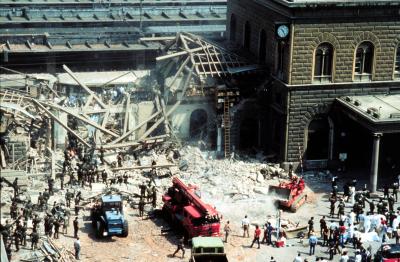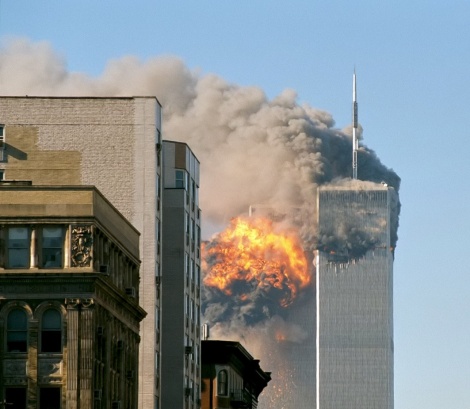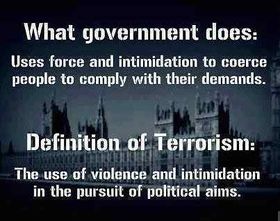Difference between revisions of "Terrorism"
(→History: Security and Defence Learning) |
|||
| Line 108: | Line 108: | ||
{{FA|Cyberterrorism}} | {{FA|Cyberterrorism}} | ||
The 21<sup>st</sup> century has seen the promotion of the word "[[cyberterrorism]]", which purports to be the threat posed by terrorists to computer based infrastructure. The {{ccm}} are expansive about the threat, but the word is rarely defined, and the media's claims rarely if ever stand up to close scrutiny (indeed, they are rarely detailed enough to warrant it). Major practitioners of this would appear to be the [[NSA]], whose extensive [[hacking]] capabilities have been demonstrated by the [[Edward Snowden Affair]]. Western {{ccm}} never describes the NSA as cyberterrorists, although they have created [[malware]] intended to damage critical infrastructure, such as [[Stuxnet]]. | The 21<sup>st</sup> century has seen the promotion of the word "[[cyberterrorism]]", which purports to be the threat posed by terrorists to computer based infrastructure. The {{ccm}} are expansive about the threat, but the word is rarely defined, and the media's claims rarely if ever stand up to close scrutiny (indeed, they are rarely detailed enough to warrant it). Major practitioners of this would appear to be the [[NSA]], whose extensive [[hacking]] capabilities have been demonstrated by the [[Edward Snowden Affair]]. Western {{ccm}} never describes the NSA as cyberterrorists, although they have created [[malware]] intended to damage critical infrastructure, such as [[Stuxnet]]. | ||
| − | + | ||
| + | ===COVID-19=== | ||
| + | Hardcore [[anti-vaxxers]] may ‘need deradicalising like terrorists’.<ref>https://metro.co.uk/2021/12/08/hardcore-covid-anti-vaxxers-may-need-deradicalising-like-terrorists-15734866/</ref> | ||
| + | |||
| + | {SMWDocs}} | ||
| + | |||
==References== | ==References== | ||
{{reflist}} | {{reflist}} | ||
Revision as of 20:32, 9 December 2021
Not to be confused with its alter ego, counter-terrorism
The word "Terrorism" derives from its classical Latin root "terror" meaning "alarm'" or "great fear". It's earliest use in English was to describe the mass intimidation of the French Revolution as "The reign of terror". Its first recorded written usage was in 1898 to describe the Irish rebellion of that year replacing the previously ubiquitous description of Irish rebellious violence - "dynamitism" [1]
In its modern - especially 21st century - usage, it has become ubiquitous as an enemy image word used to promote anger and fear against its designated targets. It is an increasingly common aspect of commercially-controlled media reports in the 21st century, particularly since 9/11. The stereotypical image, that of a Muslim suicide bomber, is exploited to try to scare lawmakers into passing Draconian and vaguely worded laws, and to scare the public into acquiescing. These laws often related to mass surveillance or otherwise infringe on civil liberties. Fox News reported in 2009 that the US Department of Defense was referring to protest activity as "low level terrorism"[2] and non-violent peace campaigners have been the victim of them.
“Terrorism is not really an '-ism'. There's no connection between the Sandinistas who fought the Contras and Al Qaida or Colombia's FARC and fisherman turned pirates in Africa and Asia, yet they are all called "terrorists". That's just a convenient way for your government to convince the world that there is another enemy '-ism' out there, like communism used to be. It diverts attention from the very real problems.
Our narrow-minded attitudes and the resultant policies foment violence, rebellion and wars. In the long run, almost noone benefits from attacking the people we label as "terrorists", with one, glaring exception:- the corporatocracy. Those who own and run the companies that build the ships, missiles and armoured vehicles, make guns, uniforms and bulletproof vests, distribute food, soft drinks and ammunition, provide insurance, medicines and toilet paper, constructions ports, airstrips and housing and reconstruct devastated villages, schools, factories and hospitals. They, and only they, are the big winners. The rest of us are hoodwinked by that one, loaded word "terrorist".
The current economic collapse has awakened us to the importance of regulating and reining in the people who control the businesses that benefit from the misuse of words like "terrorism" and who perpetrate other scams. We recognize today that white collar executives are not a special, incorruptible breed.”
Miguel d'Escoto Brockmann [3]
The United States legal definition of terrorism specifically excludes acts done by sovereign states.[4][5] According to U.S. law (22 U.S.C. 2656f(d)(2))[6] terrorism is defined as “premeditated, politically motivated violence perpetrated against noncombatant targets by subnational groups or clandestine agents, usually intended to influence an audience".[7][8][9] There is no international consensus on a legal or academic definition of terrorism.[10] United Nations conventions have failed to reach consensus on a definition of terrorism and state terrorism.[11] Nevertheless, "terrorism" is used to describe incidents "facilitated" by agents provocateurs from the FBI's Joint Terrorism Task Force.
"Terrorism is the war of the poor. War is the terrorism of the rich." - Leon Uris
Contents
Sub-Pages
| Page Name | Size | Description |
|---|---|---|
| "Terrorism/Financing" | 414 | |
| "Terrorism/Preparation" | 19,170 | Terror drills are part of the "war on terror". In theory, they help defend against "terrorists". In practice, they are also used to stage false flag events. This article notes that many such events seem to coincide with or immediately presage actual attacks. |
| "Terrorism/Response" | 4,222 | Responses to high profile acts of "terrorism" have been remarkably uniform in nature |
Official narrative
The official narrative of terrorism is that in the 21st century, modern technology and increased access to information (especially about WMD, "weapons of mass destruction") has brought about a grave threat which needs to be countered by exceptional measures. Collectively referred to as the "War on terror", governments need such measures to be able to protect their citizens from heightened threat posed by "extermist" terrorists.
The commercially-controlled media consistently promote the official narrative about terrorism, especially from Muslims.[12] In November 2014, the BBC headlined a story that "Terrorism threat is on the increase".[13] In January 2016, Ross Douthat wrote for the New York Times that immigration of Muslims into Germany "threatens not just a spike in terrorism but a rebirth of 1930s-style political violence."[14]
Problems
The most obvious weakness of the official narrative is that, as EU Counter-terrorism Coordinator, Gijs M. de Vries, noted in 2005 that "we still lack a global definition of terrorism."[15] Professor Mark Selden observes that "American politicians and most social scientists definitionally exclude actions and policies of the United States and its allies [as terrorism]".
Other major problems include its failure to mention (or sometimes, its explicit exclusion of[16]) state terrorism, false flag terrorism or the clear motivations of "counter-terrorist authorities" to exaggerate or deliberately increase "the terrorist threat". The prison-industrial-judidicial-intelligence agency enforcement complex has an obvious commercial incentive for increasing terrorism and fear of it.
"Between 1970 and 2012 the chance that an American would, in any one year, be done in by terrorism was 1 in 4 million – much less than half the chance of being killed by a home appliance."[17]
The FBI, for example, has incited many terrorist plots in USA (according to Project Censored, the majority[18]) but commercially-controlled media are very reluctant to report on this. Since 2001 especially, the deep state has been rolling back civil liberties and building a police state under the pretext of the "War on terror".
Language
Wikispooks has a lot of material relating to both "terrorism" and "counter-terrorism". Since early 2017 it has followed the lead of other terrorsceptic internet commentators[19][20] and applying double quotes around the word "terrorism" to highlight its deceptive nature.
The hypocrisy of the word is illustrated by a now declassified 1978 CIA document which described Operation Condor — a project of mass murder, torture and terrorisation which killed perhaps 70,000 people and imprisoned hundreds of thousands more — as a "cooperative effort by the intelligence/security services of several South American countries to combat terrorism and subversion."[21]
History
Russian revolutionary violence from the middle of the nineteenth century through to the 1917 Bolshevik revolution was usually decribed as "terrorism". Stalin's 1930's purges became known as "The Great Terror". Zionist violence against the British authorities in UN Mandate Palestine from 1945 to 1948 was routinely described as "Jewish terrorism". Israel used the word "terrorism" in the 1960s and '70s to refer to attacks by Palestinians, whether against civil or military targets.
In 1972, Richard Nixon, describing attacks on civil aviation, became the first US President to use the word "terrorism".[22] President Carter used the word "terrorism" about the hostage taking of the US embassy staff in Tehran, but the word remained very seldom used until the 1983 Beirut barracks bombings.[22]
Deep state nexus
The most important conference in the establishment of the "war on terror" was the JCIT held in Jerusalem in 1979, which attributed a lot of "terrorism" - inaccurately - to the Soviet Union. Many speakers at this conference had close connections with the Military Industrial Congressional complex. Deep state operatives have exercised sharp control of the narrative about "terrorism" and especially after 2001 were quick to exploit the fear laden enemy image to promote "counterterrorism". From 2005-2012, Harold Elletson (MI6) chaired a series of 8 conferences to try to shape media perceptions on the subject, which were attended by other operatives later to join the Template:UKDS's Integrity Initiative.
Strategy of Tension
- Full article: Strategy of Tension
- Full article: Strategy of Tension
The phrase "strategy of tension" is a long term policy of maintaining continual stress upon a population. It is derived from the Italian (strategia della tensione) which described the Years of Lead in which the country was terrorised by Operation Gladio.
After 9-11, the project was expanded by the "War on terror", as the pseudo-communists terror of Operation Gladio were replaced by the pseudo-Islamic menace of Operation Gladio/B.
False flag terror
- Full article:
 False flag
False flag
- Full article:

Arguably, most large scale terrorist plots in the 21st century have been false flag attacks, i.e. designed to be blamed on people other than the real perpetrators. The extent this represents a new tendency is moot and likely to remain so (due to the difficulty of establishing the real perpetrators of acts of terrorism now long past), but can be surmised to include a more generalised concensus of world public opinion that terrorist attacks are wrong, whatever their details and motivations. In a world in which such an understanding is firmly established, there is little to gain and a lot to lose by carrying out acts of terror — while false flag attacks become correspondingly more attractive to those groups who believe that they can not only not only them out but also successfully pin the blame on some other group.
In 2014, Human Rights Watch issued a report that reported that almost all the highest-profile domestic terrorism plots in the United States since 9/11 featured the "direct involvement" of government agents or informants. It reported that "in some cases the FBI may have created terrorists out of law-abiding individuals by suggesting the idea of taking terrorist action or encouraging the target to act."[23]
Response
- Full article: “Terrorism/Response”
- Full article: “Terrorism/Response”
The response to "terrorism" has been remarkably uniform in nature, as governments around the world have used the fear (or acquiescence) of their populace to introduce additional "anti-terror" laws and other technologies that facilitate mass surveillance of the citizenry.
"Counter-terrorism"
- Full article:
 “Counter-terrorism”
“Counter-terrorism”
- Full article:
Many governments have established "counter-terrorism" units, which have special training and are typically heavily armed. They often have a mandate not only to the prevent terror but to take immediate control of the investigation of such acts. The use of specialised groups facilitates the containment of evidence, to prevent details from becoming known to a wider audience.
Terrorism research
- Full article:
 Terrorism research
Terrorism research
- Full article:
"Terrorism research" institutions are a part of the efforts of "counter terrorists". Nafeez Ahmed describes a very large proportion of terrorism research as "bullshit", and observes that "among the most consistent findings is that the field is full of very serious, beard-stroking, speculative conjecture dressed up as ‘theory'."[24] These institutes employ "terror experts" who not only research but also shape public opinion by appearing on commercially-controlled media. Several have been set up by member of deep state milieux, particularly Le Cercle.
Post 9/11 developments
The 9-11 attacks were the seminal deep political event of the 21st century. They are recommended for study by anyone seeking to understand the rise of "terrorism".
"War on terror"
- Full article: War on terror
- Full article: War on terror
The "war on terror", although planned at events such as the 1979 JCIT, was not rolled out until September 2001. It shifted the enemy image of the communist for that of the "Islamic terrorist". The naive assumption that the purposes of the "war on terror" include the elimination of "terrorists" overlooks more cogent motivations such as self-enrichment, covering up of earlier crimes and in particular the introduction of a technological control grid including mass surveillance and the de facto elimination of civil liberties.
"Extremism"
- Full article:
 “Extremism”
“Extremism”
- Full article:
The lack of a consistent legal definition of "terrorism" has encouraged the use of alternative vocabulary. The 7/7 bombings in London were described "violent extremism" by the commercially-controlled media, which launched the term in July 2005. The phrase "Non-violent extremism" was launched in January 2011, and "terror experts" have argued the (etymologically intuitive point) that these are "the distinction between “non-violent extremism” and “violent extremism” is not a valid one” (Alex Schmid). The word "radicalisation" is often used in connection with measures to censor the internet, amid claims that information has the power to change people into (usually religious, i.e. Muslim) "extremists".
"Domestic Terrorism"
- Full article: Domestic Terrorism
- Full article: Domestic Terrorism
After spreading the meme of "Islamic terrorism", and introducing laws with the implication that "this for for them, not us" the phrase "domestic terrorism" was gradually introduced, equating with terrorism many kinds of dissent which were legal and/or non-violent. Documents from the FBI and the Department of Homeland Security identify the non-violent Occupy movement as a “terrorist” activity.[25] The FBI however turned a blind eye (or worse) to the Dallas occupy plot, a "a long-term plan to kill local Occupy leaders via sniper fire".[26]
Cyberterrorism
- Full article: “Cyberterrorism”
- Full article: “Cyberterrorism”
The 21st century has seen the promotion of the word "cyberterrorism", which purports to be the threat posed by terrorists to computer based infrastructure. The commercially-controlled media are expansive about the threat, but the word is rarely defined, and the media's claims rarely if ever stand up to close scrutiny (indeed, they are rarely detailed enough to warrant it). Major practitioners of this would appear to be the NSA, whose extensive hacking capabilities have been demonstrated by the Edward Snowden Affair. Western commercially-controlled media never describes the NSA as cyberterrorists, although they have created malware intended to damage critical infrastructure, such as Stuxnet.
COVID-19
Hardcore anti-vaxxers may ‘need deradicalising like terrorists’.[27]
{SMWDocs}}
References
- ↑ Terrorism - Online etymology Dictionary
- ↑ http://www.foxnews.com/story/2009/06/17/pentagon-exam-calls-protests-low-level-terrorism-angering-activists.html
- ↑ Hoodwinked
- ↑ Gupta, Dipak K. (2008). Understanding terrorism and political violence: the life cycle of birth, growth, transformation, and demise. Taylor & Francis. p. 8. ISBN 978-0-415-77164-1. http://books.google.com/books?id=a5S8tAyPuQwC&pg=PA8
- ↑ Sinai, Joshua (2008). "How to Define Terrorism". Perspectives on Terrorism. Terrorism Research Institute. 2 (4). http://www.terrorismanalysts.com/pt/index.php/pot/article/view/33/html
- ↑ http://www.law.cornell.edu/uscode/422/usc_sec_22_00002656---f000-.html
- ↑ Gupta, p. 8
- ↑ http://www.terrorismanalysts.com/pt/index.php/pot/article/view/33/html
- ↑ http://www.state.gov/s/ct/rls/crt/2006/82739.htm
- ↑ Williamson, Myra (2009). Terrorism, war and international law: the legality of the use of force against Afghanistan in 2001. Ashgate Publishing. p. 38. ISBN 978-0-7546-7403-0. http://books.google.com/books?id=ZuJIPP9HfRsC&pg=PA38
- ↑ Rupérez, Javier (6 September 2006). "The UN's fight against terrorism: five years after 9/11". U.N. Action to Counter Terrorism (in Tr. from Spanish). Real Instituto Elcano of Spain. http://www.un.org/terrorism/ruperez-article.html }}
- ↑ http://www.unwelcomeguests.net/672
- ↑ http://www.standard.co.uk/news/crime/terrorism-threat-is-on-the-increase-met-chief-tells-bbcs-andrew-marr-show-9878141.html
- ↑ http://www.nytimes.com/2016/01/10/opinion/sunday/germany-on-the-brink.html?_r=1
- ↑ https://www.nato.int/docu/review/2005/Combating-Terrorism/Gijs-de-Vries-counter-terrorism/EN/index.htm
- ↑ https://en.wikipedia.org/wiki/List_of_terrorist_incidents_in_2001
- ↑ https://www.globalresearch.ca/why-gullible-about-government-face-covid-19/5727835
- ↑ http://www.projectcensored.org/4-fbi-agents-responsible-for-majority-of-terrorist-plots-in-the-united-states/
- ↑ https://www.techdirt.com/articles/20160812/15531535228/did-fbi-get-confused-arrest-own-informant-for-helping-create-fbi-plot.shtml
- ↑ http://www.unwelcomeguests.net/747
- ↑ http://archive.fo/kiO1D
- ↑ a b http://www.unwelcomeguests.net/747
- ↑ http://www.theguardian.com/world/2014/jul/21/government-agents-directly-involved-us-terror-plots-report
- ↑ https://medium.com/insurge-intelligence/the-astonishingly-crap-science-of-counter-extremism-65810f8ac8e6?source=latest---------6
- ↑ http://www.projectcensored.org/7-fbi-dismisses-murder-plot-occupy-leaders-nsa-big-business-cracks-dissent/
- ↑ http://web.archive.org/web/20141018093606/http://whowhatwhy.com/2013/06/27/fbi-document-deleted-plots-to-kill-occupy-leaders-if-deemed-necessary/
- ↑ https://metro.co.uk/2021/12/08/hardcore-covid-anti-vaxxers-may-need-deradicalising-like-terrorists-15734866/

